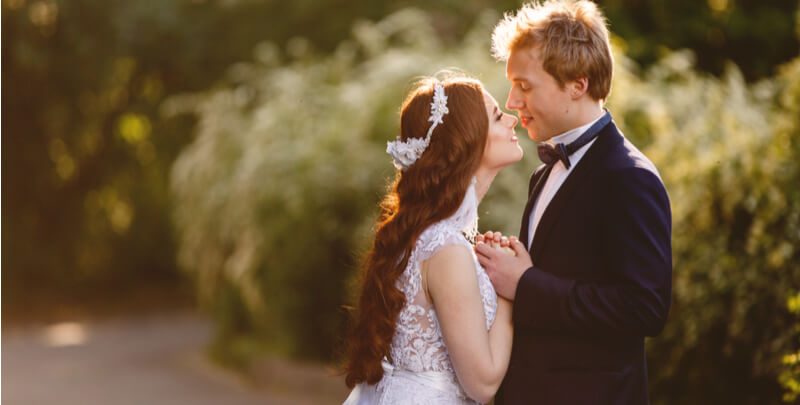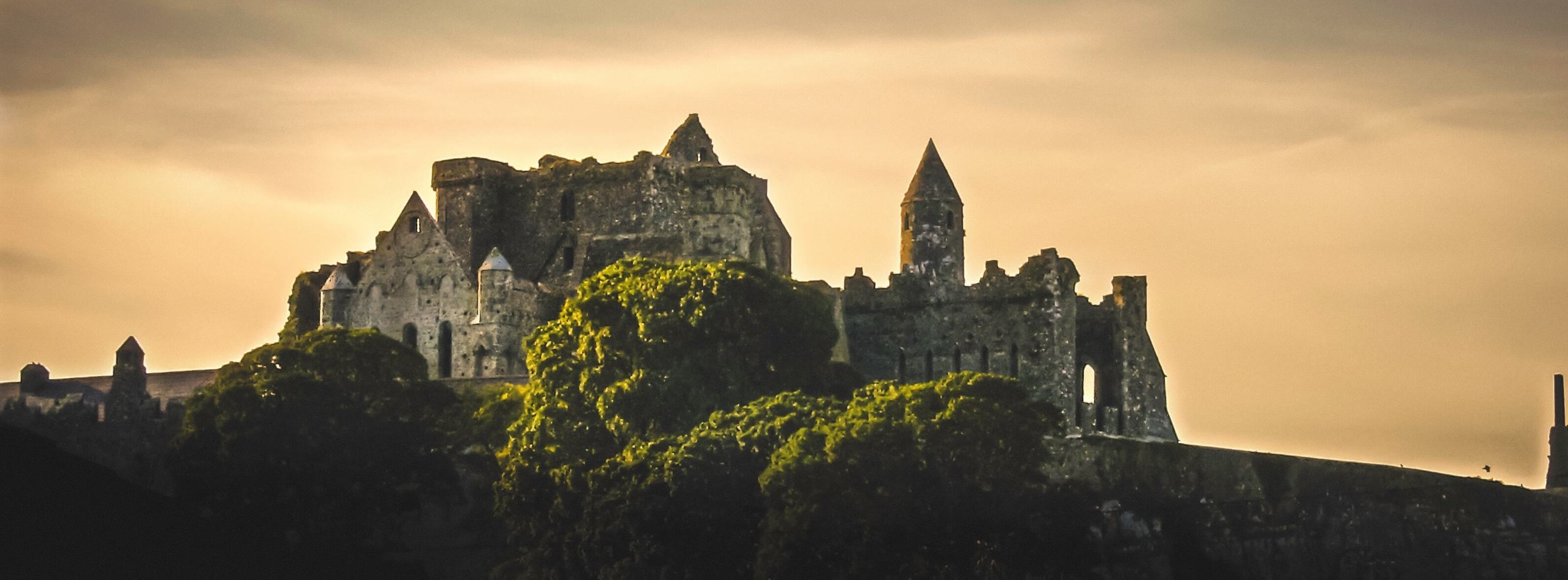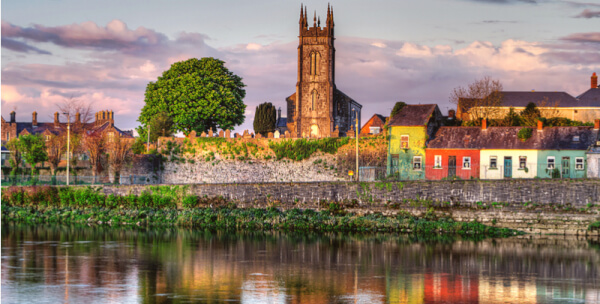Ireland Dialling Code - How to call Ireland from UK
Need to call a friend in Ireland? You might be checking in with a relative who lives there, or perhaps ringing an Irish business about an order. Whichever is...

The legal requirements for getting married in Ireland are pretty straightforward. However, as with any wedding, you can’t get around putting in some effort, time and administration. People from all around the world choose to get married in Ireland because of the country’s rolling green hills, poetic traditions, warm culture and lively musical and social rituals. The Emerald Isle is a great choice for a destination wedding, for those with Irish heritage or who just want an Irish experience.
This article will help you with everything you should know leading up to your Irish wedding day. Read on for a summary of legal logistics, traditional customs and suggested wedding locations across Ireland.
Both religious and civil weddings are legally recognised in Ireland. You can also get married by secular ceremony if neither of the other options appeal to you. Same-sex marriage has been legal in Ireland since 2015 after the passage of The Marriage Act 2015. Marriages that were formed abroad and same-sex marriages are also recognised in Ireland.
However, some religions don’t recognise same-sex marriage. Which means if you’re looking to have a same-sex wedding that’s religious, you should check with your local place of worship for specific details on what they’ll be willing to perform.
Couples must provide an ‘intent to marry’ at the registry office that’s local to their expected wedding venue - whether the wedding is civil, religious or secular. In addition, both parties must be at least 18 years old to legally marry in Ireland.
If you’re a foreign national couple, you should plan to give a three-month notice of your intent to marry. To speed things up, many registries will allow you to do this over the phone so you don’t have to be physically present.
If you’re a foreign national marrying an Irish citizen, you don’t need to have Irish citizenship to have your wedding in Ireland.
You’ll have to provide minimum documentation for a spiritual or civil ceremony in Ireland. You may need additional paperwork for a religious ceremony. Make sure you’ve got the following documents for your wedding:
A Catholic wedding may also require some or all of the following documentation:
First you must submit your notice of intent to marry to the local registry office. Do this about three months before you plan for the wedding to take place. Also let the registry know what type of wedding you’re planning to have.
Plan to meet with the registrar at least five days before your wedding with all your official documentation bearing the apostille stamp. This meeting will confirm the date of the wedding and the receipt of your notification to marry, and provide you with a Marriage Registration Form (MRF). This form authorises the marriage to go forward. You can’t legally marry without it. It must be signed by the solemniser and your two witnesses.
For Catholic weddings specifically, you must respect the rules of the Church. For example, many parishes won’t allow ceremonies to take place on a Sunday, or outdoors. The marriage will be conducted by a priest or deacon who is officially considered a ‘solemniser.’
After the marriage, the religious authority or registrar will officially register your marriage and you’ll receive the marriage certificate. You can pick it up at your local registrar’s office.
For an Irish wedding, expect to pay some administrative fees upfront. You should expect:
In addition to these administrative fees, there may be some charges specific to your venue or parish. You should inquire directly in advance. Once the administrative fees are covered, you should only expect to be paying for normal wedding details like the venue, the evening entertainment and other aspects of your wedding celebration.
While you’re planning your budget, make sure you don’t lose any money on bank fees or crazy exchange rates when you transfer money to Ireland. Banks and traditional money transfer businesses often advertise low fees, but offer consumers poor exchange rates - meaning you lose out on a lot without realizing it. Use a Wise Borderless account, which allows you to hold and manage your money in multiple currencies and convert at the real exchange rate, the same one you’ll find on Google.
To have a religious wedding in Ireland, you’ll likely need to do a fair amount of advanced planning, including several meetings. The majority of religious weddings in Ireland are Catholic. You should contact the house of worship where you wish to get married directly in order to get the full rundown of what you’ll need to do.
Civil ceremonies are held at a registry office in a local municipality, or in any venue that’s registrar-approved. Whether it’s a castle, old manor or an outdoor spot, approval may hinge on an inspection from the registrar prior to the wedding day.
The secular, or spiritualist, ceremony is gaining more popularity in Ireland. It’s a more flexible choice and isn’t as strict about location or timeline. A secular wedding can be held inside or outside, on a Saturday or a Sunday. It’s legally recognised if you notify the state in advance, make a declaration of impediment and are issued the MRF. You also must give a copy of the MRF, signed by your spiritual minister, to the registry office in order to complete your marriage and get your certificate issued.
You can check out the following consular and embassy websites for more information about marrying in Ireland as a foreign national:
Weddings in Ireland can be flexible on cost. You’ll find weddings at both ends of the spectrum, from incredibly large and lavish, to small, intimate and budget-friendly. Here are some cost estimates for a wedding in Ireland:
| Wedding Item in Ireland | Approximate cost |
|---|---|
| Venue | €5,000 |
| Wedding Planner | €1,500 |
| Band | €2,000 |
| Photographer | €1,500 |
| Dress | €1,000 |
| Makeup, Hair and Jewelry | €700 |
| Florist | €630 |
| DJ | €275 |
| Drink | €60 per person |
| Food | €50 per person |
| Cake | €100 |
If you’re looking for a place to get started in finding the perfect spot for your ceremony, the following are 10 popular wedding venues in Ireland:
| Venue | Description |
|---|---|
| Solis Lough Eske Castle (Donegal) | A secluded lakeside property |
| Shelbourne Hotel (Dublin) | A traditional luxury hotel |
| Brigit’s Gardens (Galway) | Atmospheric grounds with four gardens based on the festivals of the Celtic year for indoor and outdoor weddings |
| The Angler’s Rest (Castleknock) | A picturesque location reputed for its seafood menu and culinary focus |
| Lough Cutra Castle (Galway) | A historic fairytale-like setting |
| Smock Alley Theatre (Dublin) | A former theatre that was converted into a church with stained glass windows and unique brickwork |
| Blackrock Castle Observatory (Cork) | A traditional fort with turrets, ramparts and towers that houses a restaurant and star-gazing observatory |
| Ghan House (Carlingford Lough) | An 18th century seaside complex with high stone walls |
| The Carriage Rooms at the Montalto Estate (Ballynahinch) | A former stable block and one of Ireland’s premier private estates |
| Mount Druid (Westmeath) | An alternative quirky parkland with yurts, huts, a converted loft, a tin chapel, a barn for dancing and a boathouse for receptions |
You might consider including some of the following Irish traditions as part of your wedding:
A wedding in Ireland will be a warm, vibrant and lively affair. Although it may take some planning and administrative work, it will likely be a memorable occasion for all involved.
*Please see terms of use and product availability for your region or visit Wise fees and pricing for the most up to date pricing and fee information.
This publication is provided for general information purposes and does not constitute legal, tax or other professional advice from Wise Payments Limited or its subsidiaries and its affiliates, and it is not intended as a substitute for obtaining advice from a financial advisor or any other professional.
We make no representations, warranties or guarantees, whether expressed or implied, that the content in the publication is accurate, complete or up to date.

Need to call a friend in Ireland? You might be checking in with a relative who lives there, or perhaps ringing an Irish business about an order. Whichever is...

Your essential guide to importing a car from Ireland to the UK, covering the costs, documents and procedures to follow.

Travelling or moving to the Emerald Isle? You may be wondering how you can order your bits and pieces online directly to your doorstep. As an expat or even...

A full guide on how to get an Irish citizenship, including routes to citizenship, fees and processing times.

Everything you need to know about moving to Ireland from the UK, including visas, cost of living, property, healthcare and more.

Everything you need to know about retiring in Ireland, including how much money you’ll need and whether UK citizens need a visa.